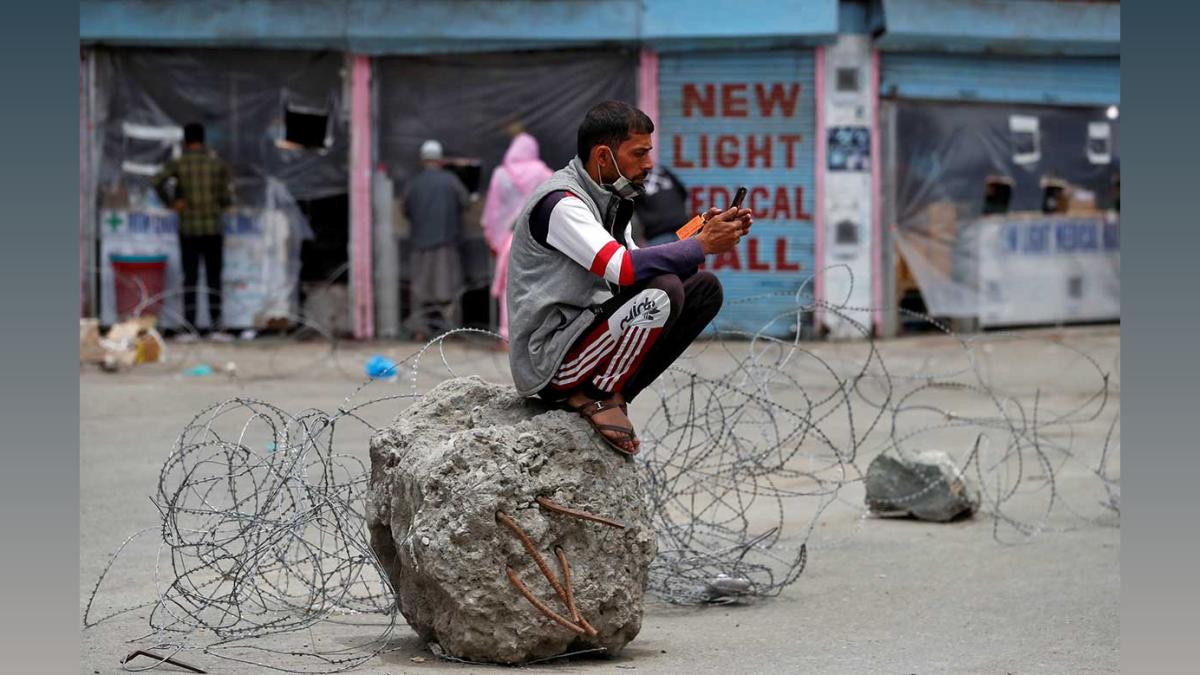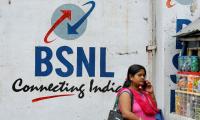India's Mobile Tariffs Among Lowest: Govt Debunks Cong Claims
The Indian government has asserted that India's mobile tariffs are among the lowest globally, dismissing Congress's claims about recent mobile tariff hikes. The ministry says the market operates through demand and supply forces, with TRAI regulating tariffs.

Photograph: Danish Ismail/Reuters
New Delhi, Jul 5 (PTI) The government asserted on Friday that India's mobile services market operated through forces of demand and supply with three private telcos plus one public sector player and offered subscribers among the lowest tariffs globally as it dismissed "misleading claims" on the recent mobile tariff hikes.
The statement from the Union Ministry of Communications came after the Congress criticised the government over mobile tariff hikes announced by the three leading companies and questioned how the telcos could be permitted to unilaterally increase rates without any oversight and regulation.
Tearing into the Congress' claims, the ministry in its statement argued that over the past two decades, the rates of mobile services had been kept under forbearance by the Telecom Regulatory Authority of India (TRAI) and added that policies of the government and regulatory framework notified by the regulator had resulted in "one of the lowest cost for subscribers of mobile services in India".
It provided a comparative chart of prevailing prices in the US, Australia, the UK, Russia and other markets to press its point.
In the case of India, at an average price of USD 1.89 per month, practically unlimited voice call and 18 GB data are available to mobile subscribers, it said, citing other markets where the rates were higher.
"With three private sector players and one public sector player, the current mobile services market operates through the market forces of demand and supply," it said.
The focus is to protect the interests of subscribers, enable orderly growth with investment in the latest technologies and ensure financial viability, the ministry said in its response to "misleading claims regarding recent mobile services tariff increase".
Further, it said mobile services were being delivered by three private sector licensees and one public sector licensee which, from a competition point of view, was an optimal market structure for mobile services.
"The rates of telecommunication services are decided by market forces, within the regulatory framework notified by the independent regulator, that is, TRAI. The government does not intervene in the free market decisions as the functionality is under the domain of TRAI and tariffs are under forbearance," the statement said.
Telcos have increased the prices of mobile services after more than two years, it further said.
"In the last two years, some of the TSPs (telecom service providers) have invested heavily in rolling out 5G services across the country. This has resulted in a significant increase in median mobile speed to the level of 100 Mbps and a jump in India's international rank from 111 in October 2022 to 15 today," it said.
While protecting the interests of subscribers, an orderly growth of the telecom sector (which include investments in the latest technologies like 5G, 6G, IoT/ M2M for Industry 4.0 etc) requires financial viability of the sector, which is "important", it added.
"Before the last 10 years, the telecommunication sector was mired in controversies, lack of transparency and, therefore, growth of mobile services was stagnant. During the last 10 years, due to progressive policies of the government, the rates of telecommunication services, be it voice or data, have fallen exponentially. The government has been a beneficiary of a large amount of non-tax revenue from spectrum auction, which has been fully transparent and efficient," the statement said.
The statement from the Union Ministry of Communications came after the Congress criticised the government over mobile tariff hikes announced by the three leading companies and questioned how the telcos could be permitted to unilaterally increase rates without any oversight and regulation.
Tearing into the Congress' claims, the ministry in its statement argued that over the past two decades, the rates of mobile services had been kept under forbearance by the Telecom Regulatory Authority of India (TRAI) and added that policies of the government and regulatory framework notified by the regulator had resulted in "one of the lowest cost for subscribers of mobile services in India".
It provided a comparative chart of prevailing prices in the US, Australia, the UK, Russia and other markets to press its point.
In the case of India, at an average price of USD 1.89 per month, practically unlimited voice call and 18 GB data are available to mobile subscribers, it said, citing other markets where the rates were higher.
"With three private sector players and one public sector player, the current mobile services market operates through the market forces of demand and supply," it said.
The focus is to protect the interests of subscribers, enable orderly growth with investment in the latest technologies and ensure financial viability, the ministry said in its response to "misleading claims regarding recent mobile services tariff increase".
Further, it said mobile services were being delivered by three private sector licensees and one public sector licensee which, from a competition point of view, was an optimal market structure for mobile services.
"The rates of telecommunication services are decided by market forces, within the regulatory framework notified by the independent regulator, that is, TRAI. The government does not intervene in the free market decisions as the functionality is under the domain of TRAI and tariffs are under forbearance," the statement said.
Telcos have increased the prices of mobile services after more than two years, it further said.
"In the last two years, some of the TSPs (telecom service providers) have invested heavily in rolling out 5G services across the country. This has resulted in a significant increase in median mobile speed to the level of 100 Mbps and a jump in India's international rank from 111 in October 2022 to 15 today," it said.
While protecting the interests of subscribers, an orderly growth of the telecom sector (which include investments in the latest technologies like 5G, 6G, IoT/ M2M for Industry 4.0 etc) requires financial viability of the sector, which is "important", it added.
"Before the last 10 years, the telecommunication sector was mired in controversies, lack of transparency and, therefore, growth of mobile services was stagnant. During the last 10 years, due to progressive policies of the government, the rates of telecommunication services, be it voice or data, have fallen exponentially. The government has been a beneficiary of a large amount of non-tax revenue from spectrum auction, which has been fully transparent and efficient," the statement said.
You May Like To Read
TODAY'S MOST TRADED COMPANIES
- Company Name
- Price
- Volume
- Vodafone-Idea-L
- 11.65 (+ 3.56)
- 106772451
- Alstone-Textiles
- 0.28 ( -3.45)
- 44187760
- Mangalam-Industrial
- 0.88 ( -2.22)
- 39177573
- Sunshine-Capital
- 0.27 (+ 3.85)
- 35956340
- GMR-Airports
- 104.40 (+ 6.37)
- 30453005






